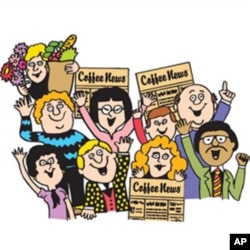People who are grabbing coffee or a meal at a restaurant are sure to have some time on their hands while they wait to place their orders and receive their food.
All the while, they often wish they had something quick, light, and interesting to read.
A single, thick sheet of paper fills that need and serves neighborhood businesses in 700 U.S. communities and 400 other places around the world.
It’s a weekly publication that’s printed, front and back, in three columns, and placed in racks for customers to pick up. The middle column is filled with wise sayings, trivia items, notes about the day in history, weekly horoscopes and offbeat stories, such as a recent item about a horse that stands just 36 centimeters tall. The whole sheet takes about 10 minutes to read.
The two outside columns are packed with ads for neighborhood car washes, wedding photographers, pest-control companies and so forth.
The idea originated in Winnipeg, Canada, in 1982, with a woman named Jean Daum. She had seen restaurant patrons pick up sugar packs from their containers on the table and read the brief, entertaining factoids printed on the back, just to pass the time.
She began distributing a little newsletter, loaded with breezy reading material, to restaurants, coffee shops, barber shops - even hospital waiting rooms. She called it Coffee News. Pretty soon, other businesses started calling her, asking for copies to give to their customers, and it wasn’t long before she was selling Coffee News franchises all across Canada.
When Baum died of cancer in 2007, Bill Buckley purchased worldwide distribution rights. The former potato farmer in the northeastern state of Maine had obtained the first Coffee News franchise in the United States 12 years earlier.
Just this week, his representative signed up the first Coffee News franchise in Congo, which joins 300 other overseas outlets in 20 countries.
The lighthearted reading material in Coffee News is still produced in Winnipeg, then edited in Maine by Buckley’s wife, Sue-Ann. Franchisees pay $8,500 for the right to distribute the publication in territories of up to 50,000 people. The franchisees sell the ads and insert them into the newsletter.
Readers get something new and light, advertisers get a captive audience for their messages, and, if all goes well over the course of a year, the franchisee makes a good living.






